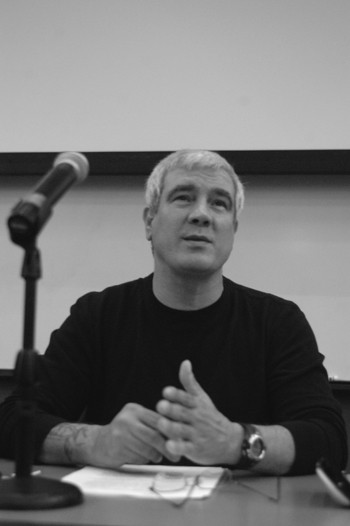
Former death row inmate and author Kerry Cook speaks. (Lindsey Perkins)
Kerry Max Cook was a juvenile delinquent. He ran away from home at 19, became a bartender and stole a sheriff’s car. Although he later turned himself in, it would not take long for him to break parole.
Cook was a juvenile delinquent, but that did not make him a murderer.
On June 10, 1977, Cook met 21-year-old Linda Edwards at a swimming pool in Tyler. She invited him to her apartment and in return he left with a few hickies on his neck.
Cook said he had no idea how much those “passion marks” and a single finger print left on Edwards’ door would cost him when he was arrested two months later for her rape and murder.
Based solely on circumstantial evidence and false testimonies from two witnesses, Cook was convicted and sentenced to death. For the next 13 years, Cook said he was brutally raped, stabbed and beaten in prison for a crime he did not commit.
After two decades in prison, the Texas Court of Criminal appeals finally reversed Cook’s conviction in 1996, and now his case is documented as the worst example of prosecutorial misconduct in Texas history.
To tell his story and help spread knowledge about death row and the death penalty, Cook came to SMU on Thursday night to discuss his book “Chasing Justice” based on his experience and how it has changed his view of the legislative system.
“What makes my case so rare is the overwhelming documentation that I was framed,” Cook said. “Every day for me was a physical, mental struggle to survive.”
Cook credits his survival due to insanity. During his first year in prison, Cook said he was held in solitary confinement, naked in a dark, 5-by-9 foot cell.
His only way to keep track of the date was to scratch a mark with his fingernail each day when a cold peanut butter and jelly sandwich was pushed into his cell. Later, Cook said he would run his fingers over the marks like brail to figure out the date.
However, no amount of madness could keep him from attempting the worst recorded suicide attempt in Texas prisons after he heard of his brother’s murder, father’s death of cancer and that his attorney had abandoned him.
“I thought to myself, ‘Everyone wants to kill me,'” Cook said. “‘Here let me help you.’ For the first time in 10 years of being incarnated, I was showed respect because they thought that I was crazy, and I was crazy – for my innocence.”
Now a successful author and father, Cook said the two things most important to him are his six-year-old son, Justice, and talking with students about his story.
“For the first time since I was 20 years old, I feel like it was all worth it,” Cook said. “If just one of you goes out and picks up my book and it changes or alters the way you think, then everything I went through was worth it.”
Since he was released, Cook said the only apology he has received was from the only criminal who was in the court room, Edward “Shyster” Jackson, who later admitted the district attorney had threatened him so he would testify against Cook.
Cook, who had been on death row longer than most college students have been alive, was a part of what SMU Director of Human Rights Dr. Rick Halperin believes to be the largest group of people in the country the public doesn’t care about.
Since the 1980s, globally there has been an average of four countries per year to end the death penalty – which Helperin said is no accident.
“The trend is as clear as the sun coming up tomorrow,” Halperin said. “But you wouldn’t know that living in this country and especially in this state.”
Out of the 1,070 people who have been put to death since 1976, Halperin said 391 were in Texas, and during the last year 12 out of the 13 people killed on death row were in Texas.
Although Cook considers himself to be pretty conservative, he said that after his experience on death row he cannot encourage the death penalty.
“I don’t believe putting anyone to death under any circumstance, because how many innocent people will have to die in order to put one (guilty person) to death?” Cook said.








